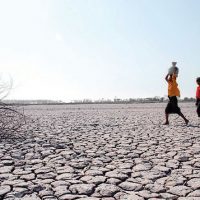-
On robots and sheep
A short introduction to historical materialism and its significance for the understanding of contemporary capitalism.
-
Channel the panic into political action
A conversation with Andreas Malm about the impotence of postmodernism in face of climate change and capital’s role in the destruction of nature.
-
Thousands of Greeks Take to the Streets . . . and Chant the Name of Their Finance Minister
“Has there ever been a demonstration where people chanted the name of a finance minister? This must be a world first!” says the ironic Xenia, a 53-year-old woman who has been shouting for several minutes, with thousands of demonstrators, the now omnipresent name in Athens: “Yanis Varoufakis, Yanis Varoufakis, Yanis Varoufakis!”
-
Syria’s Ali Haidar: Both Sides Have Extremists
Syrian National Reconciliation Minister Ali Haidar is optimistic, but still thinks that “Syria is on top of a volcano.” Haidar, who is also the President of the Syrian Social Nationalist Party (SSNP), maintains that he “joined a project and not a ministry,” revealing that contacts with the armed opposition are underway.
-
Euro Exit? Interview with Economist Alberto Montero Soler
Alberto Montero Soler: First of all, I have to say that those effects would only manifest themselves in the medium term. To propose an exit from the euro as an immediate solution to the deterioration of living conditions of people would mean to deceive them. We are at a crossroads where peripheral economies can only choose between two evils.
-
Morales Repeals Decree Raising Fuel Prices
Bolivian President Evo Morales repealed on Friday night the decree issued five days ago to raise gasoline prices, after a meeting with his cabinet, trade unions, and social organizations in La Paz.
-
Interview with Alí Rodríguez Araque, Minister of Economy and Finance, Venezuela
The government estimates the growth rate will be 2% at the maximum this year.
“The strategy is to create a public instrument in which the banks place certain percentages of their targeted portfolios.”
-
In Lebanon, the Spectre of Peace
Hezbollah is the big winner in the accord on Lebanon signed in Doha, Qatar. But everyone — including Washington — is welcoming this asymmetrical compromise. Why? Hard bargaining is underway. . . .
In the Middle East, neither the worst nor the best is ever certain. But what happened in Doha, the capital of Qatar, on Wednesday, at 3 o’clock in the morning, is a historic event. The accord putting an end — for now — to the political crisis that tore Lebanon for the past eighteen months (and many more in fact) contains a tough lesson for the West: its weakened friends in Beirut had to bend themselves to the force of Hezbollah and its allies Amal, another Shi’i party, and the Christians led by Michel Aoun. The Party of God will enter the government without laying down its arms, as a minority with veto power.


